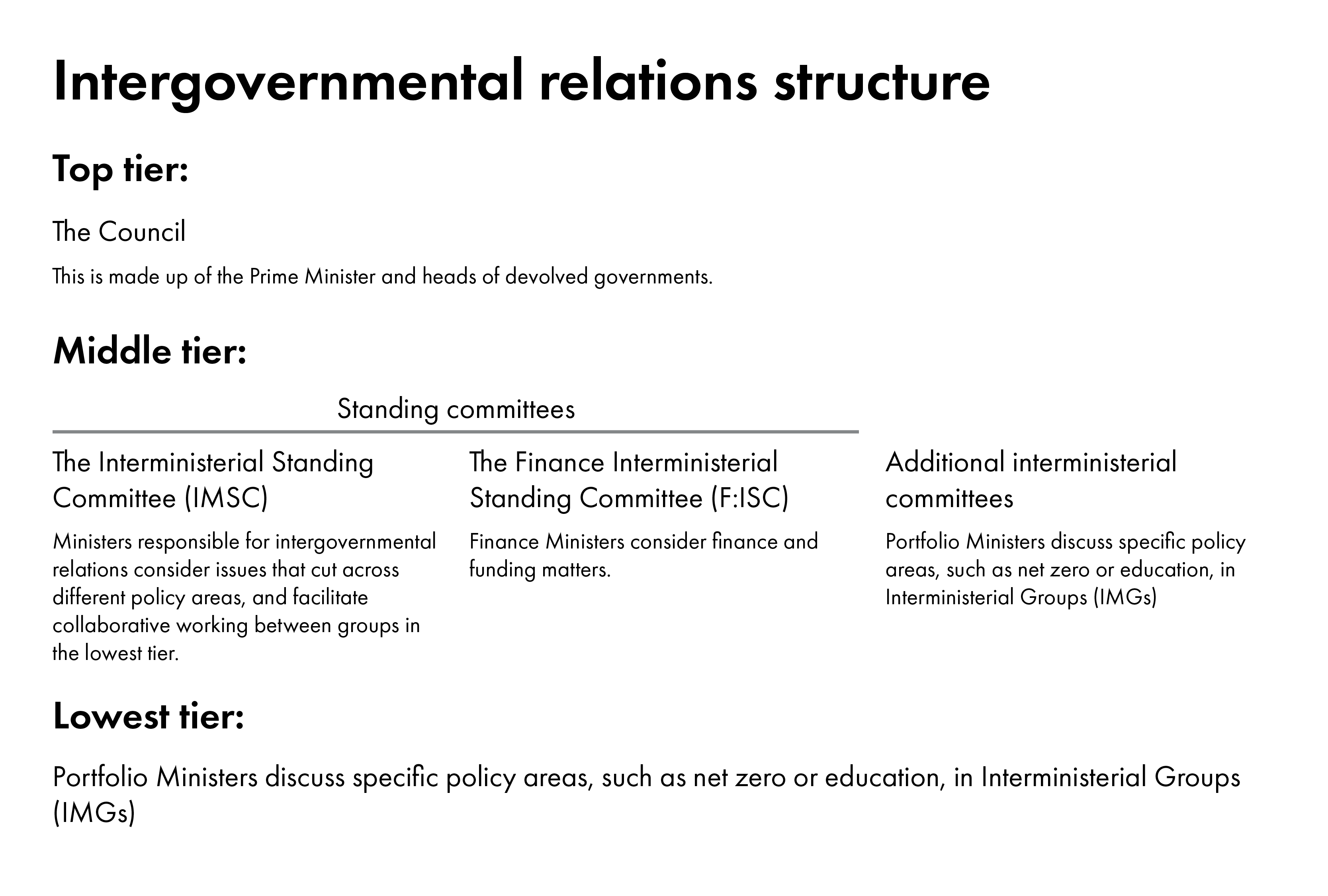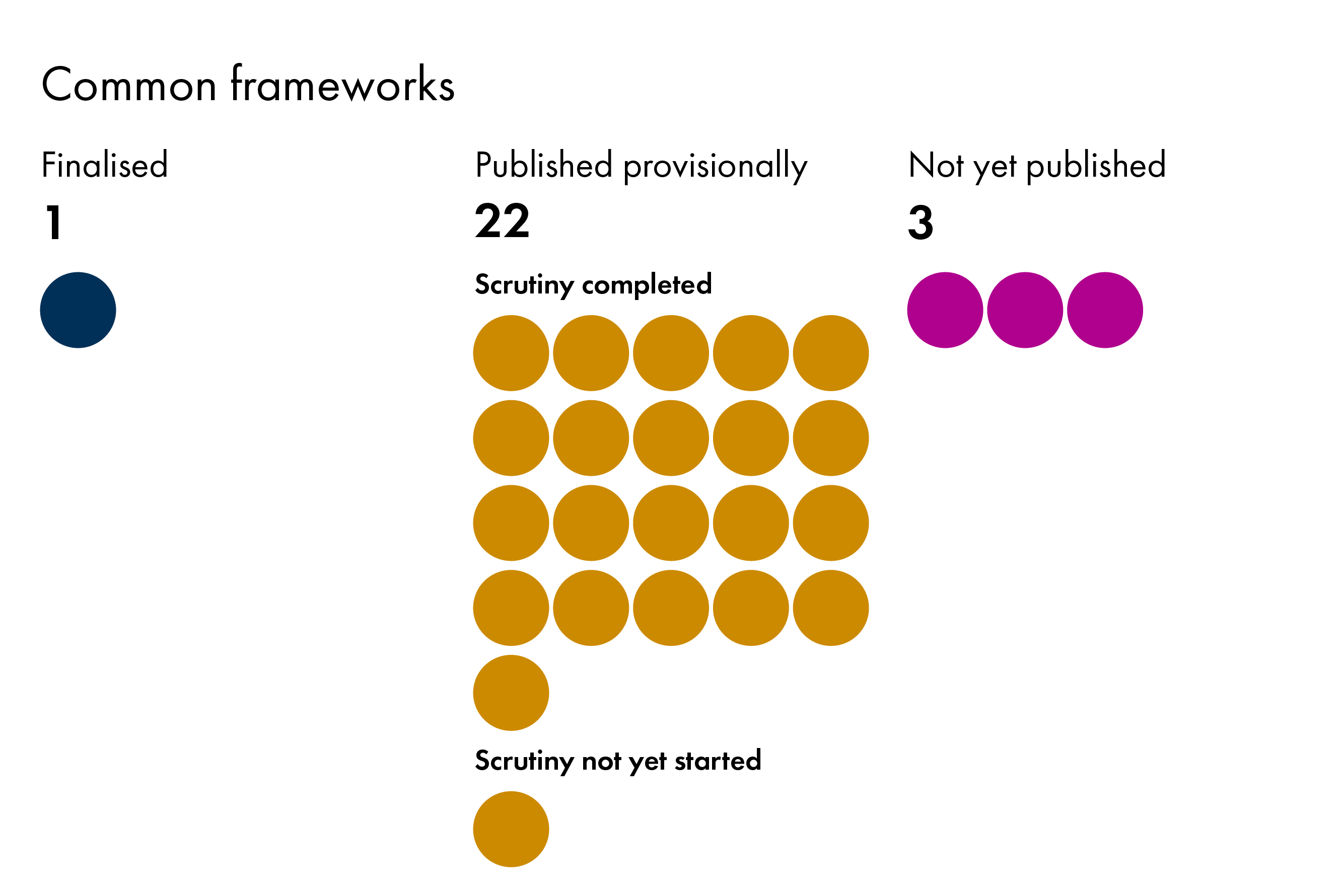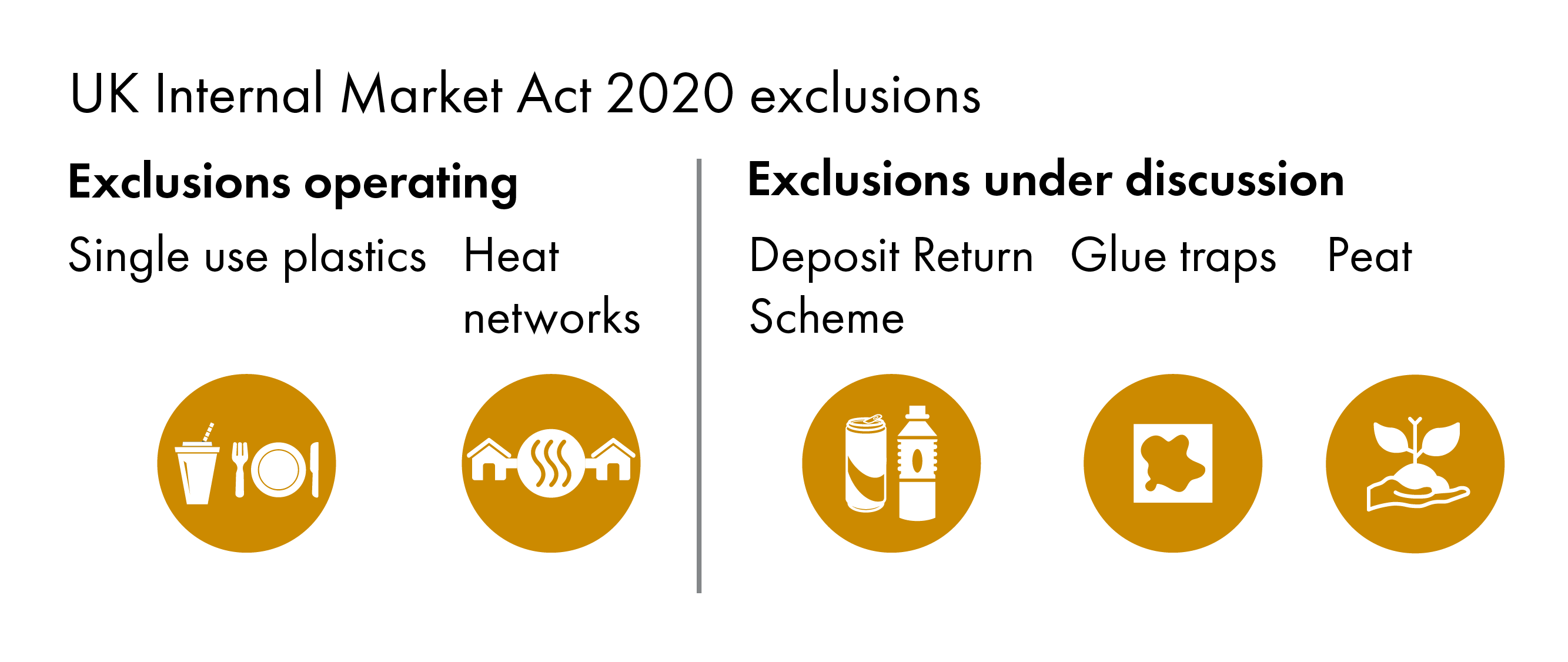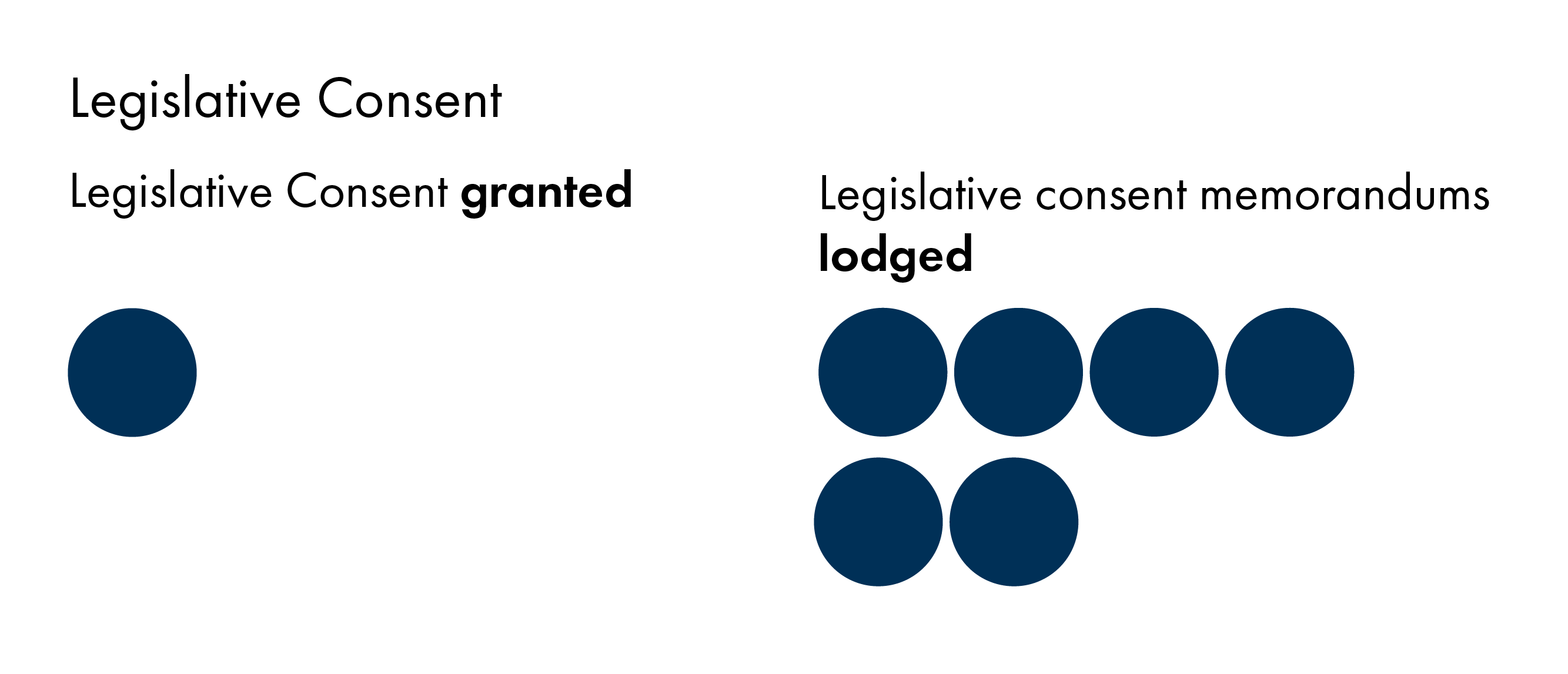Intergovernmental activity update Q4 2023
This update gives an overview of intergovernmental activity of relevance to the Scottish Parliament between the Scottish Government and the UK Government, the Welsh Government, and the Northern Ireland Executive during quarter four (October-December) of 2023.
Introduction
SPICe publishes quarterly updates to give an overview of intergovernmental activity. 'Intergovernmental activity’ refers to work between governments – in a Scottish context between the Scottish Government and the UK Government or other devolved governments. It can include discussions on areas of mutual interest, policy development, and policy implementation. Read more about what intergovernmental activity is and why awareness of it is an essential element of parliamentary scrutiny on our SPICe blog. SPICe has also launched an intergovernmental activity hub that collates information on intergovernmental activity of relevance to the Scottish Parliament.
Updates are published on the last Thursday of the month following the end of the reporting period. The next quarterly update, covering quarter 1 (January-March) of 2024, will be published on 25 April 2024. This update reflects information available at the time of publication.
Highlights
.png)
Intergovernmental activity
Formal intergovernmental interactions take place under the following structure, which was established in January 2022.

See a SPICe blog for more information on how the new structure operates.
Interministerial meetings
.png)
The Interministerial Standing Committee met on 19 October 2023. Discussions included:
proposals on creating a 'smokefree generation'. The minutes state that "Ministers jointly agreed to continue to work together on this significant health initiative on a UK-wide basis." The UK Government set out its plans to introduce a Tobacco and Vapes Bill in the King's Speech. See a SPICe blog on the King's speech for more information. The UK Government and devolved governments undertook a joint consultation on proposals to create a 'smokefree generation' and tackle youth vaping from October 2023 to December 2023. In a blog for UK in a Changing Europe, Dr Thomas Horsley reflects on the significance of this four-nations approach.
the UK Government's addition of XL Bully dogs to the list of dogs banned under the Dangerous Dogs Act 1991 in England and Wales. The minutes state that the Scottish Government is "actively developing its own proposals." The Scottish Government set out its position on 11 January 2024. It stated that "Tight safeguards on XL Bully dogs are to be introduced in Scotland to make it a criminal offence to own the breed without an exemption certificate. The legislation will mirror what has been introduced by the UK Government in England and Wales, and prevent Scotland from becoming a ‘dumping ground’ for this breed."
Intergovernmental Relations Secretariat
The Intergovernmental Relations review, published in January 2022, set out a role for an independent secretariat. This secretariat will have an important role in dispute resolution, but limited information on the establishment of the secretariat had been available in previous quarters. Terms and reference for the secretariat were published on 27 November 2023. Minutes for the Interministerial Standing Committee from 19 October 2023 state that "The Committee noted 2 papers in relation to the Intergovernmental Relations Secretariat" but provide no further information.
Interministerial Groups (IMGs) met twice during the reporting period:
The Interministerial Group for Trade met on 29 November 2023. Discussions included:
the World Trade Organization's 13th Ministerial Conference due to take place in February 2024
the UK’s US State trade memorandum of understanding programme and the UK’s delivery of trade initiatives outlined in the Atlantic Declaration, a US-UK Economic Partnership framework agreed in June 2023.
The Interministerial Group for Housing, Communities and Local Government met on 13 December 2023. Discussions included the impacts of regulation on the private rented sector and challenges around affordable homes and housing supply.
Intergovernmental Group on UK-EU Relations
According to the UK Government's Interactive Transparency Dashboard, an Intergovernmental Group on UK-EU Relations has been meeting in Q1, Q2, and Q3 of this year. No information about activity during Q4 is available at the time of publication. No minutes from this group have been published to date. Previous meetings are listed as 'no' under 'communique (published or to be published)' on the UK Government's dashboard. Ministerial statements by the Welsh Government provide information about issues discussed at meetings in June 2023 and September 2023.
Common frameworks
Common frameworks are intergovernmental agreements which set out how governments will work together to make decisions about policy in certain devolved policy areas, in particular decisions about policy divergence. Common frameworks were originally intended to be used to consider matters which were former EU competences, however, some also state that they may be used to consider related matters within the wider policy area. Read more about what common frameworks are on our intergovernmental activity hub.
No new framework agreements were published during the reporting period. The image below provides an update on frameworks relevant to Scotland and scrutiny of frameworks at the Scottish Parliament.

During the reporting period, scrutiny of nine frameworks was completed at the Scottish Parliament:
The Net Zero, Energy and Transport Committee wrote a letter to the Cabinet Secretary for Transport, Net Zero and Just Transition, Màiri McAllan MSP, on 23 November 2023 about the UK Emissions Trading Scheme Common Framework. The Committee drew attention to a response it had received to its call for views from the Scottish Environment Protection Agency. The Committee stated that it had no further comments to make on the framework at this time but intended to monitor its operation.
The Rural Affairs and Islands Committee wrote a letter to the Cabinet Secretary for Rural Affairs, Land Reform and Islands, Mairi Gougeon MSP, on 20 December 2023, summarising its findings on the following frameworks:
Chemicals and Pesticides
Fisheries Management and Support
Agricultural Support
Agriculture - Fertilisers
Agriculture - Organic Production
Animal Health and Welfare
Plant Health
Plant Varieties and Seeds
In its letter, the Committee noted a lack of clarity about the purpose of common frameworks and raised issues around the consistency of drafting in the framework agreements it had considered. It further noted the potential impact of the UK Internal Market Act 2020 on the operation of common frameworks and requested that the devolved legislatures be notified if an exclusion to the market access provisions of the Act is sought or a decision on an exclusion request made.
The House of Lords Common Frameworks Scrutiny Committee has ceased operation. The Committee was appointed in September 2020 to scrutinise common frameworks. The Committee's formal remit was due to expire on 31 December 2023 but the Committee decided that in the absence of a functioning Northern Ireland Assembly and Executive "further productive scrutiny of the Common Frameworks programme is therefore no longer possible and, for this reason, the Committee has agreed to disband as of the time of Prorogation on 26 October." The Committee wrote a letter summarising its work and conclusions. It states:
Common Frameworks have proved to be an important mechanism for reaching consensus on policy areas for which powers returned to the UK on its departure from the European Union and, with the following caveat, it remains our view that the Frameworks have proven to be robust, innovative, and unique sources of collaboration between the UK Government and the devolved governments. We are still, however, of the opinion that Common Frameworks remain an ‘unfulfilled opportunity’ on the grounds that neither the original expectations of Common Frameworks as vehicles for policy development, nor the potential for using the Common Frameworks as a mechanism for policy coordination, have been met.
The Rt Hon Michael Gove MP, UK Government Minister for Intergovernmental Relations, responded to the letter on 8 November 2023:
Whilst full implementation has not been possible due to the collapse of the Northern Ireland Executive, 30 of 32 Frameworks are operational. The development has also been complicated by the fact that Frameworks development has proceeded in parallel with substantive policy design. My officials are carrying out an evaluation of the programme which I believe will support our assessment that Frameworks have already been beneficial to policy design. This evaluation should be published next year.
At a meeting of the Interparliamentary Forum on 27th October 2023, representatives from the Scottish Parliament, House of Commons, Senedd Cymru, and the House of Lords agreed to write to Ministers from the UK Government, the Scottish Government, and the Welsh Government to request that annual reports be provided on each provisionally agreed framework in addition to annual reports on finalised frameworks. The Constitution, Europe, External Affairs and Culture Committee subsequently wrote to the Minister for Intergovernmental Relations, the Rt Hon Michael Gove MP.
The Minister responded on 19 December 2023. Regarding the request for annual reporting on provisionally agreed frameworks, the Minister stated:
Any decision to report to legislatures on the provisional Common Frameworks would require the agreement of constitutional ministers in the Government and the devolved administrations. This was the case previously when agreement was reached for annual reporting on fully implemented Frameworks. As you are aware, however, the Northern Ireland Executive is not currently in a position to provide this. Though Common Frameworks have been operating provisionally for some time, my department is currently conducting an evaluation of the entire programme, which is likely to be published in the Spring.
The letter further stated:
In terms of Common Frameworks reporting, the agreed annual reporting for fully implemented Frameworks will provide a key tool for enabling scrutiny of the programme by both legislatures and indeed the Inter-Ministerial Standing Committee.
The letter also mentions that "the second report for the Hazardous Substances Common Framework [the only framework finalised to date] will be issued in due course". However, it does not appear that a first review of the Hazardous Substances Common Framework has been published.
UK internal market
The UK Internal Market Act 2020 is UK-wide legislation about the flow of goods and services. You can read more about the Act's provisions in our SPICe briefing and a SPICe blog.
UK Internal Market Act exclusions
A process has been established by which the UK Government and devolved governments can consider exclusions to the market access principles of the UK Internal Market Act 2020 ('UKIMA'). Read more about the interaction between the exclusions process and common frameworks in our SPICe blog.

The United Kingdom Internal Market Act 2020 (Services Exclusions) Regulations 2023 ('the Regulations') were made on 23 November 2023 and came into force the next day. The Regulations amend, add and remove entries in Part 1 and 2 of Schedule 2 of UKIMA to which the market access principles in UKIMA do not apply.
The explanatory memorandum states that changes made by the Regulations include:
adding exclusions to Part 1 of Schedule 2 for gas, electricity, water, waste, heat networks and qualifications-awarding services; amending the entry for the “social services” exclusion in Parts 1 and 2 of Schedule 2; removing the exclusions for financial services, electronic communications services and temporary work agencies from Parts 1 and 2 of Schedule 2, and; removing the exclusions for postal services and services of a statutory auditor from Part 2 of Schedule 2.
The UK Government sought but did not receive the consent of Scottish Ministers to these Regulations. In accordance with section 18(10) of UKIMA, the Secretary of State for Business and Trade, the Rt Hon Kemi Badenoch MP, provided a statement on why the UK Government decided to proceed with the Regulations in the absence of consent from all devolved governments (consent was provided by Welsh Ministers). It states:
These Regulations are important to ensuring that the scope of application of the market access principles in Part 2 of the UKIM Act better reflects how services are currently regulated across the UK. I therefore intend to proceed with making the United Kingdom Internal Market Act 2020 (Services Exclusions) Regulations 2023. My officials have worked closely with their counterparts in the Devolved Administrations throughout this process.
The Scottish Government set out its position not to provide consent in a letter to the Economy and Fair Work Committee. It stated that "while a decision to exclude the regulation of Heat networks from the Act is welcome, the Scottish Government is not in a position to consent to this SI given its overall purpose of widening the scope of the UKIM Act."
Look out for: potential further developments over coming quarters
Discussions regarding to potential further UKIMA exclusions relating to peat and glue traps took place during Q4. Both matters have not been discussed through common framework groups as the policy areas are not in scope of existing frameworks.
Peat
In its 2021-2022 Programme for Government, the Scottish Government committed to consult on a ban on the sale of peat-related gardening products. It subsequently consulted on a proposal to ban the sale of peat in stages from February to May 2023. The Scottish Government published its analysis of the responses in December 2023.
In August 2022, the UK Government had asked the Office for the Internal Market to produce a report on its proposals to ban sales of peat and peat-containing products in England. The Office for the Internal Market's report was published in February 2023. The UK Government has stated that it intends to ban the sale of horticultural peat (for use in the gardening sector) by 2024.
According to the minutes of a meeting of the Interministerial Group for Environment, Food and Rural Affairs, which took place on 13 September 2023:
Next Scottish Government presented a paper on plans to ban the sale and possession of glue traps and its interaction with the UK Internal Market Act. It was noted that engagement between governments is ongoing, and it was agreed that further discussions would take place at the next IMG.
Glue traps
The Wildlife Management and Muirburn (Scotland) Bill is currently under consideration in the Scottish Parliament. The bill as introduced would ban the purchase and use of glue traps. While the Welsh Government has banned the use of glue traps and the UK Government has similar plans using powers provided under the Glue Traps (Offences) Act 2022, neither is currently proposing to ban their sale. The policy memorandum for the Bill states that the Scottish Government wishes to ban the sale of glue traps, as well as their use and purchase, but that UKIMA affects this. It further states:
For a ban on the sale of glue traps to be compliant with the IMA, an exemption to the IMA for this purpose would need to be in place. The Scottish Government is exploring the possibility of gaining an exemption with the UK Government and devolved administrations and should an exemption be granted; the Scottish Government intends to bring forward an amendment at Stage 2 or Stage 3 of the Bill to ban the sale of rodent glue traps in Scotland
In a letter to the Convener of the Rural Affairs and Islands Committee from 19 January 2024, the Minister for Energy and the Environment, Gillian Martin MSP, stated:
I set out in that letter my intention to introduce provisions to ban the sale and possession of glue traps, by amendment, during Stage 2 or Stage 3 of the Bill, in anticipation of concluding discussions with the UK Government and other devolved governments on the matter of an IMA exclusion.
I am writing now to advise the Committee that that due to a conclusion not being reached with the UK Government on this matter ahead of Stage 2, I do not intend to bring forward any amendments at Stage 2 of the Bill. I will provide you with a further update of my plans to bring forward amendments to ban the sale and possession of glue traps ahead of Stage 3.
Legislative consent
According to the Sewel Convention, the UK Parliament will not normally legislate on devolved matters without the consent of the Scottish Parliament. The Scottish Parliament’s standing orders set down rules which apply where UK primary legislation requires the Parliament’s consent under the Sewel Convention. They apply where UK primary legislation makes ‘relevant provision’, which means provision which applies to Scotland in any of the following ways:
for any purpose within the legislative competence of the Scottish Parliament
to alter the legislative competence of the Scottish Parliament
to alter the executive competence of the Scottish Ministers.
When any of the criteria on relevant provision are fulfilled, a member of the Scottish Government is obliged to lodge a legislative consent memorandum. A legislative consent memorandum, amongst other things, sets out the Scottish Government's view on whether the Parliament should grant legislative consent.
Following the lodging of a legislative consent memorandum, members of the Scottish Parliament may vote on a legislative consent motion to agree whether it is content that the relevant provision in the Bill should be considered by the UK Parliament. Only motions seeking consent are called 'legislative consent motions' in accordance with the Parliament's standing orders. However, the Scottish Parliament has also voted on motions which seek to withhold consent. This update provides information on all motions relating to bills in respect of which a legislative consent memorandum was lodged during the reporting period. Not every legislative consent memorandum will result in a motion granting or withholding consent. Find out more about legislative consent on the Scottish Parliament's website

During the reporting period, one motion granting legislative consent for the Economic Crime and Corporate Transparency Bill was approved.
The Scottish Government lodged 6 legislative consent memorandums:
| Bill title | Date memorandum lodged | Consent recommendation by Scottish Government |
|---|---|---|
| Criminal Justice Bill | 21 December 2023 | Consent recommended |
| Automated Vehicles Bill | 20 December 2023 | "The the Scottish Government is not presently in a position to make any recommendation to the Scottish Parliament as to consent." |
| Animal Welfare (Livestock Exports) Bill | 19 December 2023 | Consent recommended |
| Investigatory Powers (Amendment) Bill | 15 December 2023 | Consent recommended |
| Trade (Comprehensive and Progressive Agreement for Trans-Pacific Partnership) Bill | 22 November 2023 | Consent recommended |
| Economic Crime and Corporate Transparency Bill - second supplementary memorandum | 24 October 2023 | Consent recommended |
Further information
Information within this intergovernmental update is primarily based on the following sources:
The UK Government intergovernmental relations website contains minutes of interministerial groups and standing committees. Minutes of other intergovernmental meetings are not currently published and hence are not reflected in this update.
The UK Government common frameworks website contains common framework agreements.
The Scottish Parliament legislative consent website lists legislative consent memorandums and associated motions.
Further information on intergovernmental activity can be found on our intergovernmental activity hub and:
House of Commons Library briefing on intergovernmental relations
UK Government transparency reports on intergovernmental relations
Senedd Legislation, Justice and Constitution Committee Monitoring reports
Northern Ireland Assembly Brexit and Beyond newsletters.